Torch Song
Harvey Fierstein
Marin Theatre
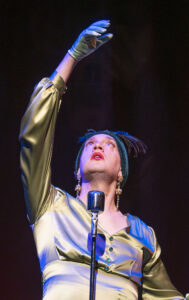
With strut and style, Virginia Ham strolls into the spotlight in full drag glory to lip sing with wonderfully exaggerated aplomb a queen’s torch anthem. By the time she has wowed us with mimicked words escaping her Mammoth-Cave-sized mouth; with eyes ready any moment to pop out of their sockets; and with hands that flit, flip, and flicker to emote every note, Arnold Beckoff has us in the palm of his hand where we will remain fixated for the next two hours, forty minutes in awe – laughing, crying, and crying from laughing. Dean Linnard as Arnold delivers a commanding, tour de force performance in Marin Theatre’s compelling and captivating staging of Harvey Fierstein’s Torch Song.
Divided into three acts and rewritten in 2017 to reduce by over an hour the original, 1982, Tonys-winning Torch Song Trilogy, the revised Torch Song retains the basics of the original’s story of a Jewish drag queen in 1970s Greenwich Village who has a history of looking in all the wrong places for the love he so desperately wants. “I’ve slept with more men than are named or numbered in the Bible,” Arnold confesses to us, “but not once has someone said, ‘I love you’ in a way that I could believe.”
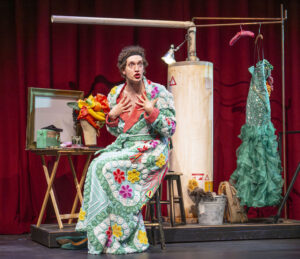
Arnold’s opening, self-deprecating act is a laugh a minute as from her dressing room, Virginia Ham explains (while adjusting her fruit-basket headdress for the next act), “I have to be a drag queen; I just can’t walk in flats.” Dean Linnard employs a myriad of facial expressions and of exaggerated hand-and-body jerks and gyrations to underline each new revelation. Over and again his depiction of Arnold edges dangerously close to the line of being too overdone, too slapstick, or too gay-stereotypic; but instead, what we get from this award-worthy performance is a genuine, believable look at the heart and soul, at the hopes and dreams, and at the hurts and angers of a drag queen we quickly come to love.
During the first act, “The International Stud” – entitled after an actual ‘70s, Greenwich Village, gay bar (with a notorious back room) – Arnold is picked up in June 1974 by a teacher from Brooklyn who is attracted by “dark romantic eyes” and a sexy voice that the curious Ed wonders, “Is it natural or do you have a cold?” As the scene jumps quickly ahead six months and after an evidently hot, interim relationship between the two, Arnold discovers in a phone call that Ed is actually also seeing someone else on the side. But this someone is not another ‘him’ as he at first suspects. A gagging, guttural ‘H’ stretches forever as Arnold finally spits out a repulsing “heterosexual” as he fully digests that the man he has fallen heads over heels is actually seeing him while on the down low.
Looking for rebound love (or at least rebound sex), a blindly probing, arm-flailing Arnold ventures into the Stud’s pitch-dark backroom, providing Dean Linnard – with wickedly inspired direction from Evern Odcikin – one more chance to flaunt his acting versatility. A sex scene with an unseen partner is perhaps the wildest, funniest few minutes I have seen on stage in a long time, with Arnold alternating between chatty, unanswered queries and animated groans and giggles as his locked arms pound his chest from the evident, thrusting action focused on his protruding behind.
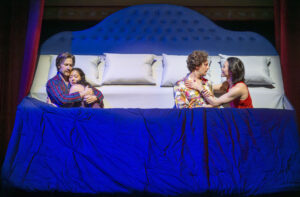
The hetero-leaning Ed (Patrick Andrew Jones) does not give up on his evident attraction and feelings for Arnold even as he professes love for his girlfriend (and later wife), Laurel (Kina Kantor). One year later as the second act, “Fugue in a Nursery,” opens, we discover that Ed and Laurel have invited Arnold – whom Laurel now knows is Ed’s ex-of-sorts – upstate for a weekend in the country. Ed has shown up unexpentedly with his new twink of a boyfriend Alan (Edric Young), much to Ed’s dismay.
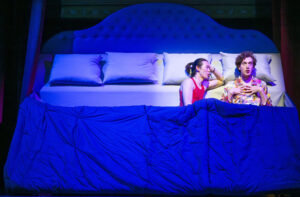
With the total scene occurring in a vertical bed big enough for four, what follows is a series of oft-hilarious scenes between every coupling possible among the four. Revelations, confessions, and surprising twists and turns spill forth as different pairs of heads pop out from under blue sheets (each new coupling’s sudden appearance aided by lighting shifts as part of Ray Oppenheimer’s precise design). The result is more laugh-out-loud hilarity but also moments of genuine heart. But even with all the comic, popping of ins and outs from the covers, the act’s energy increasingly wanes, and the clock’s minutes tick a bit too many before a welcomed intermission.
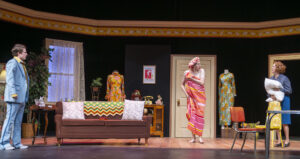
Five years pass (1980); and Act Three, “Widows and Children First” opens in a delightfully decorated apartment full of kitsch (bunnies in the wallpaper, anyone?) and a left-over dining table from the ‘50s (all part of the evening’s creative scenic design by Sarah Phykitt). Into the soap opera-ish saga of Arnold’s life arrive two new characters: a fifteen-year-old foster kid, David (Joe Ayers), who calls Arnold “Ma,” and Arnold’s own Ma, Mrs. Beckhoff (Nancy Carlin). The latter is immediately shocked (and totally disgusted) thinking high-school-aged David is her son’s latest fling but even more appalled when she finds out the teen is Arnold’s ‘son.’

Coupled with Ed now sleeping on Arnold’s couch because of trouble in married, heterosexual paradise, this final act unfolds to be a powerhouse climax of intersecting, often conflicting hopes, morals, biases, and demands. We now have a drag queen’s desire to be a dad (in an era where that was almost unthinkable); an openly gay, street-scarred kid’s hope finally to have found a loving home; a mother’s door-slamming, vitriolic reactions to any equation that Arnold can ever be a real parent or in a real loving relationship equivalent to what she had with his father; and an ex, bi, married boyfriend who is torn to tears over his own ambivalence and desires. All add to a heart-wrenching series of eruptions that over and again punctuate the brilliant script’s pervasive humor (both light and dark).
Harvey Fierstein’s original Torch Song Trilogy is still regarded as a major groundbreaking work with its authentic depiction of a gay man’s life not marred in swishy stereotypes and tragic endings. Only a few years ago a staging of Torch Song would probably have been viewed as an historical glance of what once was, given the 2015 Supreme Court, marriage equality ruling along with 21st-century screens and stages full of LGBTQ+ folks of every sort. Unfortunately, Nancy Carlin’s powerful, punch-to-the-gut portrayal of a mother’s bone-deep loathing for the life, hopes, and feelings of her queer son’s life hits today too close to home, given the current tsunami wave of homophobic, anti-trans hatred washing over half the state legislatures and their right-wing majorities.
A play that rightly should be honored for its historical significance is now Marin Theatre’s eye-opening wake-up call that the work is far from done in assuring love means love by all, for all. Not only with a starring role who alone is well worth the price of the ticket, MT’s total cast knocks it out of the ballpark in a production that is perhaps timelier and more important to be seen now that was its predecessor forty-five years ago.
Rating: 4.5 E
A Theatre Eddys Best Bet Production
Torch Song continues through June 2, 2024, in a two-hour, forty-minute (plus intermission) performance by Marin Theatre, 397 Miller Avenue, Mill Valley, CA. Tickets are available at www.marintheatre.orgor by calling the Box Office Tuesday – Friday, 12-5 p.m. at 415-388-5208.
Photo Credits: David Allen
